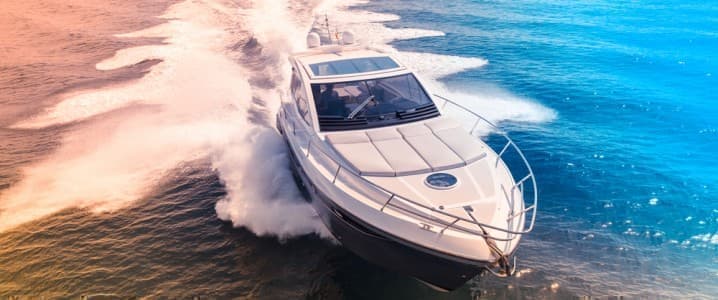As electric cars become one of the fastest-growing industries of the decade, the electrification of other vehicles is not far behind. While electric cars get most of the public attention, due to the imminent move away from fossil fuel-powered cars, several companies around the globe are pumping funds into other electric vehicles. We could soon see high-tech electric boats on our waters, opening the potential for other battery innovations.
Last month, Swedish luxury electric vehicle (EV) producer Polestar announced that it would be providing battery and charging systems to electric boat company Candela under a multi-year agreement. Not only would this provide an innovative new way of powering boats with green energy, but Candela’s design also introduces the idea of a “flying boat” through its ingenious hydrofoil technology.
Candela, founded in 2014, uses hydrofoils to lift the boat’s hull out of the water when moving, giving the appearance that it’s flying. Its zero-emissions C-8 and P-8 Voyager can travel at the high speed of 30 knots, or around 34.5 miles per hour, using this technology. It also claims the mechanism can reduce the boat’s energy usage by up to 80 percent.
For Candela, partnering with Polestar opens a world of opportunity. In an announcement, it stated that the deal allows it to “tap into state-of-the-art automotive battery technology and scale up production”. The firm also emphasized the “prohibitively high cost of marine batteries for electric boats” previously on the market, suggesting that manufacturers had to rely on smaller, boutique vendors of marine battery packs, and “scarcity and high unit costs of these packs are two factors that have prevented electric boats from achieving parity with ICE vessels.”
Meanwhile, Polestar said that this was just the start of a “broader intended partnership”, adding that the company is “committed to exploring further opportunities for future collaboration.”
Unlike the electric car industry, electric boat technology is in its nascent stage. Only the mass production of thousands of electrified boats will make them more cost-efficient and lead to the technological innovations required to help the vehicle become mainstream. Candela hopes this partnership will make it the first company to be able to achieve this level of industry development.
The electrification of water vessels is no new idea, but due to a lack of demand and several other challenges such as the high cost of batteries, little progress has been made so far. In 2020, OXIS Energy announced a $5 million contract with Singapore’s Yachts de Luxe (YdL) to build the world’s first-ever, lithium-sulfur battery-powered luxury boat. It planned to use a 400-kWh battery, with a range of 70-100 nautical miles (130-185 km). But by 2021, OXIS was facing bankruptcy due to a lack of investment required to further product development.
Thanks to the dramatic rise of the EV market, with market revenues of $105 billion in 2021 and a CAGR of 19 percent, interest in the electrification of boats and other vehicles could be picking up. In 2023, Amsterdam will hold The International Exhibition of Electric and Hybrid Marine Charging and Propulsion Technologies and Components, the “world’s only international conference exclusively dedicated to electric and hybrid marine propulsion systems, charging solutions, technologies and components.” It will showcase the latest innovations in electric and hybrid boating technologies, with 40 experts presenting technical papers on the development of the electric boat industry.
And it’s not just a niche market, with major passenger ferry companies planning to electrify services. Brittany Ferries, which connects the U.K. with France, is planning to develop the largest hybrid vessel ever built by 2024. The company aims to construct a boat with a battery capacity of 11.5 MW-hours, making it “approximately double that typically used for hybrid propulsion in marine vessels.”
The ferry will run from liquefied natural gas and/or battery power, making it more environmentally friendly. Brittany Ferries intends to roll out three hybrid ships, currently being built by Stena RoRo and incorporating battery technology from Finnish company Wärtsilä. Hakan Agnevall, the CEO of Wartsila, stated “The extensive battery size will allow the vessels to operate with full power, using both propellers and all thrusters to manoeuvre emissions-free in and out of ports, even in bad weather.”
And in the U.K., the government is thinking of ways to encourage greater vehicle electrification through schemes such as ‘electrifying the broads’ (ETB). As part of its aim to phase out the production of fossil fuel-powered vessels by 2050, the ETB partnership group comprises several companies including RenEnergy, the Broads Authority, Net Zero East, Norfolk Broads Direct, and Hethel Innovation. The organization will support research and development to decarbonize the propulsion of the most polluting cruising vessels as well as electric charging infrastructure across U.K. waters.
While the electrification of boats is in its nascent phase, as EVs become more popular and battery technology continues to improve and decrease in price, interest in the sector is gradually increasing. With several transport companies aiming to shift to greener practices, we could well see mainstream electric boats, ferries, and ships within the next few decades.
By Felicity Bradstock for Oilprice.com
More Top Reads From Oilprice.com:
- “Lehman Event” Looms For Europe As Energy Companies Face $1.5T In Margin Calls
- Can Canada Boost Oil Production While Reducing Its Emissions?
- Further OPEC+ Production Cuts Could Be Looming


















